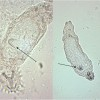Abstract
Monogeneans are a class of parasitic flatworms that are commonly found on fishes and lower aquatic invertebrates. Most monogeneans are browsers that move about freely on the fish’s body surface feeding on mucus and epithelial cells of the skin and gills; however, a few adult monogeneans will remain permanently attached to a single site on the host. Some monogenean species invade the rectal cavity, ureter, body cavity, and even the blood vascular system. Between 4,000 and 5,000 species of monogeneans have been described. They are found on fishes in fresh and saltwater, and in a wide range of water temperatures. This revised 10-page fact sheet was written by Peggy Reed, Ruth Francis-Floyd, and Ruth Ellen Klinger, and published by the UF Department of Fisheries and Aquatic Sciences, June 2012.
References
Bakke TA, Harris PD, Cable J. Host specificity dynamics: observations on gyrodactylid monogeneans. International Journal for Parasitology 32, 2002, 281-308. https://doi.org/10.1016/S0020-7519(01)00331-9
Bakke TA, Cable J, Harris PD. The biology of gyrodactylid monogeneans: "the Russian-doll killers". Advances in Parasitology, 64, 2007, 161-218. https://doi.org/10.1016/S0065-308X(06)64003-7
Buchmann K, Bresciani J. Monogenea (phylum Platyhelminthes). In Fish Diseases and Disorders, Volume 1: Protozoan and Metazoan Infections, Second Ed. Ed. PTK Woo, Cab International, Oxfordshire, UK, 2006, 297-344. https://doi.org/10.1079/9780851990156.0297
Cone DK, Gratzek JB, Hoffman GL. A study of Enterogyrus sp. (Monogenea) parasitizing the foregut of captive Pomacanthus paru (Pomacanthidae) in Georgia. Canadian Journal of Zoology 65, 1987, 312-316. https://doi.org/10.1139/z87-048
Ellis EP, Watanabe WO. The effects of hyposalinity on eggs, juveniles and adults of the marine monogenean, Neobenedenia melleni. Aquaculture 117, 1993, 15-27. https://doi.org/10.1016/0044-8486(93)90119-J
Fischthal JH, Allison LN. Acolpenteron ureteroecetes Fischthal and Allison, 1940, a monogenetic trematode from the ureters of the black basses, with a revision of the family Calceostomatidae (Gyrodactyloidea). The Journal of Parasitology 27(6), 1941, 517-524. https://doi.org/10.2307/3272527
Grutter AS, Deveney MR, Whittington ID, Lester RJG. The effect of the cleaner fish Labroides dimidiatus on the capsalid monogenean Benedenia lolo parasite of the labrid fish Hemigymnus melapterus. Journal of Fish Biology 61, 2002, 1098-1108. https://doi.org/10.1111/j.1095-8649.2002.tb02458.x
Hendrix SS. Marine flora and fauna of the Eastern United States, Platyhelminthes: Monogenea. NOAA Technical Report NMFS 121, 1994, 1-112.
Hirayama T, Kawano F, Hirazawa N. Effect of Neobenedenia girellae (Monogenea) infection on host amberjack Seriola dumerili (Carangidae). Aquaculture 288, 2009, 159-165. https://doi.org/10.1016/j.aquaculture.2008.11.038
Hirazawa N, Mitsuboshi T, Hirata T, Shirasu K. Susceptibility of spotted halibut Verasper variegatus (Pleuronectidae) to infection by the monogenean Neobenedenia girellae (Capsalidae) and oral therapy trials using praziquantel, Aquaculture 238, 2004, 83-95. https://doi.org/10.1016/j.aquaculture.2004.05.015
Hoffman GL. Parasites of North American Fishes, 2nd ed. Comstock Publishing Associates, Ithaca, NY, 1999, 95-138. https://doi.org/10.7591/9781501735059
Kearn GC. Parasitism and the Platyhelminths. Chapman & Hall, London, UK. 1998, 60-141.
Kritsky DC, Vianna RT, Boeger WA. Neotropical monogenoidea. 50. Oviparous gyrodactylids from loricariid and piemelodid catfishes in Brazil, with the proposal of Phanerothecioides n. g., Onychogyrodactylus n. g. and Aglaiogyrodatylus n. g. (Polyonchoinea: Gyrodactylidea). Systematic Parasitology 66, 2007, 1-34. https://doi.org/10.1007/s11230-006-9053-7
Poynton SL, Campbell TW, Palm HW. Skin lesions in captive lemon sharks Negaprion brevirostris (Carcharinidae) associated with the monogenean Neodermophthirius harkemai Price, 1963 (Microbothriidae). Diseases of Aquatic Organisms 31, 1997, 29-33. https://doi.org/10.3354/dao031029
Rowland SJ, Nixon M, Landos M, Mifsud C, Read P, Boyd P. Effects of formalin on water quality and parasitic monogeneanson silver perch (Bidyanus bidyanus Mitchell) in earthen ponds. Aquaculture Research 37, 2006, 869-876. https://doi.org/10.1111/j.1365-2109.2006.01505.x
Schelkle B, Doetjes R, Cable J. The salt myth revealed: treatment of gyrodactylid infections on ornamental guppies, Poecilia reticulata. Aquaculture 311, 2011, 74-79. https://doi.org/10.1016/j.aquaculture.2010.11.036
Stetter F, Untergasser D, Iglauer F, Schreckenbach K. Case report: treatment of the gillworm disease (Dactylogyrosis) of some South American cichlids and catfish. Deutsche Tierärztliche Wochenschrift 110(1), 2003, 23-30.
Thoney DA, Hargis WJ. Monogenea (Platyhelminthes) as hazards for fish in confinement. Annual Review of Fish Diseases, 1991, 133-153. https://doi.org/10.1016/0959-8030(91)90027-H
Whittington ID. The Capsalidae (Monogenea: Monoopisthocotylea): a review of diversity, classification and phylogeny with a note about species complexes. Folia Parasitologica 51, 2004, 109-122. https://doi.org/10.14411/fp.2004.016
Whittington ID, Chisholm LA. Diseases caused by Monogenea, in Fish Diseases, Volume 2, Eiras JC, Segner H, Wahli T, Kapoor BG (eds.). Science Publishers, Enfield, NH. 2008, 683-816.
Whittington, ID, Deveney MR. New Benedenia species (Monogenea: Capsalidae) from Diagramma labiosum (Perciformes: Haemulidae) on the Great Barrier Reef, Australia, with oncomiracidial descriptions and a report of egg attachment to the host. Journal of Parasitology 97(6), 2011, 1026-1034. https://doi.org/10.1645/GE-2812.1

